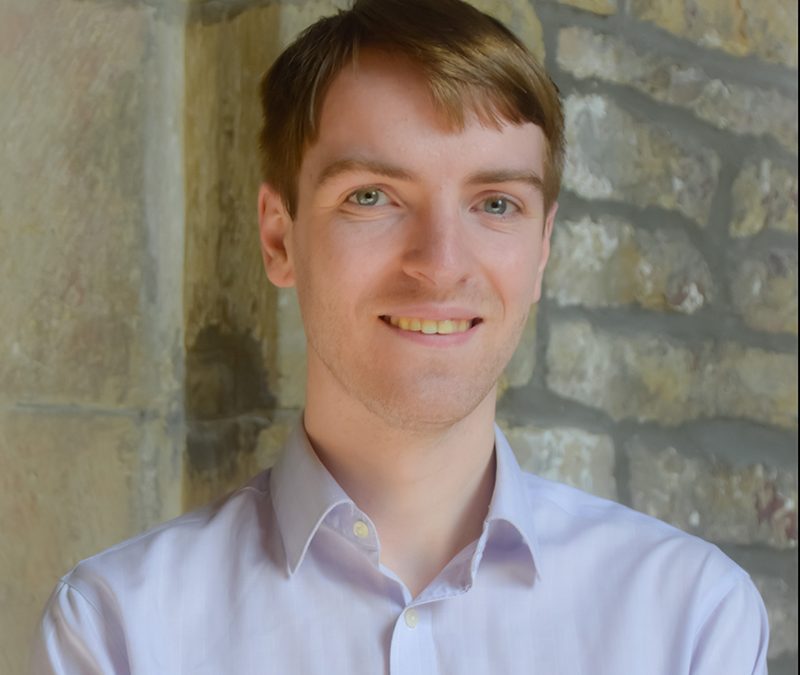On Wednesday 1st May we welcome James Mitchell for our third organ recital of the 2024 summer season. In this edition of ‘Notes from an Organist’ we discover more about them, and what to expect from their recital, including telling a story through the chosen programme; launching the inaugural ‘Sheffield Organ Festival; and working with Courtney Swain.
Could you introduce yourself, how you got into music / become an organist and your musical journey to where you are today?
I’m James and I’m the organist at Sheffield Cathedral. I first started as a cellist before properly discovering the organ at age 13. After playing at my local parishes in Devon, I took up scholarships at Ely and Manchester Cathedrals, followed by being an organ scholar at university and then Sub-Organist at Gloucester Cathedral for two years.
What can people expect from your recital at Bradford Cathedral?
Something very French! I like my recitals to tell a story, so I’m hoping people will be able to hear how the older music inspired the more modern composers.
Why do you enjoy playing the organ?
My main love since I was young was always chamber music, and so for me being able to accompany choirs on the organ for me is the ultimate summation of that. I also love the versatility of colours the organ has, I’m always discovering something new!
Do you have a particular favourite piece out of those you are playing?
Probably the Epiphanie by Gaston Litaize, it’s got the colours and harmonies of Messiaen but in a more accessible yet equally interesting idiom.
This season’s theme is ‘The French Connection (Post-Revolution France)’. How are you reflecting this in your programme?
I’m exploring how post-revolution composers returned to the sound-world of pre-revolution France. The programme is centred on two works: de Grigny’s Veni Creator and Langlais’ Suite Médiévale, exploring how Langlais adapted not just the sounds but also the structure of pre-revolution organ suites like those of de Grigny. Litaize’s Epiphanie balances these two halves, Litaize also exploring the pre-revolution soundworld yet with all the resources and flexibility of the modern Romantic organ.
What are your hopes or plans musically for 2024?
We’re launching the inaugural ‘Sheffield Organ Festival’ at the end of May, with events ranging from a performance of music from Interstellar by organist Roger Sayer to a chance to play the cathedral organ and a guide to the cinema organ with live demonstrations. The music department at Sheffield is rapidly expanding so exciting new opportunities can turn up sometimes on a daily basis. More generally, I’m just hoping to keep developing as a musician and to become the best that I can be as a person.
You are the organist at Sheffield Cathedral – how are you finding that role?
Lots of fun! We currently sing three services a week (and will be expanding to more as time progresses) but we rarely repeat music so each week offers something different. I’m also out teaching once a week in schools and have been working on rolling out a keyboard studies programme to partner schools, providing whole-class keyboard tuition with the melodica.
Could you tell us more about the YouTube series you collaborated on?
I’ve collaborated on two YouTube videos to date. The first was with composer David Bruce as part of his ‘5 Composers’ series, where five composers were commissioned to write a minute’s worth of organ music which I then recorded. I also worked with the channel Inside the Score on a video about the organ, which has somehow been viewed over 160,000 times so far!
You’ve worked with non-classical musicians including Jethro Tull, US-based producer Courtney Swain and the UK producer Ratljost – what was it like to work with those people?
Very interesting. Courtney Swain wrote a 30 minute organ piece, largely based around improvisation, which also used samples of her voice which I played through the organ (it’s a piece which can only be performed on digital instruments!). The work with Jethro Tull and Ratljost was more conventional, although the latter was again very improvisation-based. It’s been a fascinating process for all of them and I’ve learned a lot working with all these incredible musicians.
You’ve also published a book called ‘’The Pipe Organ: A Composer’s Guide’ – was that an interesting project and were there any challenges?
That was really interesting to do! I discovered lots of organ pieces and composers I’d previously never heard of while researching for it, including one of my now favourite organ pieces ever written (Thomas Kerr’s Anguished American Easter1969). There’s lots of waiting around during the publishing process followed by intense bursts of activity; it’s still slightly surreal that it’s actually finally been published and I can hold a copy in my hands!
Finally, how would you sum up your upcoming recital at Bradford Cathedral?
An exploration of the connections between French music old and new.
You can join us on Wednesday 1st May at 1pm to hear James’ organ recital, with an optional £4 buffet lunch beforehand at 12:30pm.
You can discover more about our organ recital season on our dedicated page.

